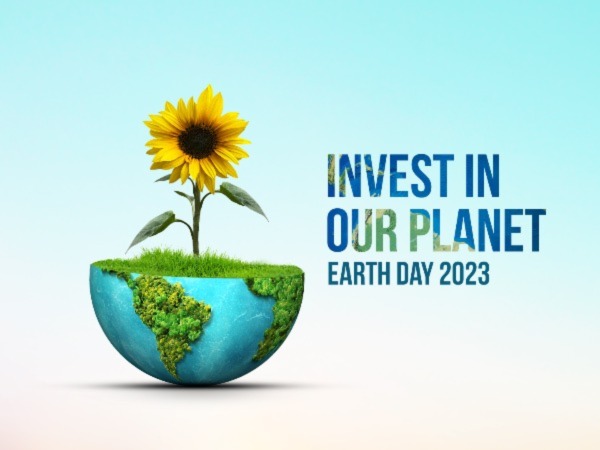
Earth Day is coming up on April 22. Are you ready?
According to Kathleen Rogers, President of EARTHDAY.ORG, “In 2023 we must come together again in partnership for the planet. Businesses, governments, and civil society are equally responsible for taking action against the climate crisis and lighting the spark to accelerate change towards a green, prosperous, and equitable future. We must join together in our fight for the green revolution, and for the health of future generations. The time is now to Invest In Our Planet.”
Here are some actions you can take now to get a head start on investing in our planet and protecting our Earth.
Reduce Waste
Reducing waste takes a little bit of planning. For example, cooking more food from fresh ingredients can reduce packaging waste, as can growing your own food in a garden. Also, eating out less can limit the number of carry-out containers you bring home. These can also save you money and create a healthier lifestyle.
How can you limit the number of single-use plastic items you use? Plastic shopping bags, disposable utensils, straws, drink cups, and fast-food packaging too often litter our land and waterways. Say “no thank you” to items you don’t need. For example, if you are heading home to eat takeout food, you probably don’t need plastic utensils or paper napkins. Likewise, if you are buying one or two items but forgot your reusable bag, you probably don’t need a plastic shopping bag.
Paper has two sides. Are you using both? On your printer, select two-sided printing or use the back side of the paper for printed drafts, handwritten notes, or lists. Do you think before you print and remember to choose only the pages you need? When you use less paper, you also use less ink — and that can lead to significant savings.
Get creative and think of more ways to reduce waste in your everyday life!
Reuse
Many things in your home have more than one use. You already reuse many things — towels and sheets, dishes, pots and pans, and clothes. Reusing isn’t about creating a new habit but rather about expanding an existing one. What else might you start to reuse? Shopping bags are an obvious choice, as is a lunch bag with washable containers. Taking advantage of the books, CDs, DVDs, and other resources at your local library and available online for download is another great way to reuse.
You can also get creative by making something new from something old, which is called upcycling. For example, an old T-shirt can be turned into a new shopping bag. Empty cereal boxes can be covered to become magazine holders, and salt boxes can be turned into matching pen and pencil cups.
Search online for “recycled crafts,” and you’ll find all sorts of clever ideas. If you have working, usable items that you no longer need, sell them at a garage sale, to a secondhand or consignment store, or through an online marketplace, such as Facebook Marketplace, Nextdoor, or OfferUp. Don’t want to bother with selling items? Give them away through an online website like Freecycle or donate them to a charitable organization.
Recycle
Most of us are used to recycling paper, boxes, cans, bottles, and jars that we use daily. But many other items can be recycled — just not with your household paper and containers. For example, you can recycle inkjet and laser printer cartridges, batteries, fluorescent tubes and bulbs, computers, tablets, televisions, appliances, cell phones, and more! For details about what and where you can recycle various items, visit our website.
Another great way to recycle is to add food waste, such as fruit and vegetable scraps, to a backyard compost bin or pile. Using compost in your garden helps build richer soil and leads to healthier plants.
Save Energy
We live in a world of gadgets. Did you know that many power adapters use electricity when nothing is plugged into them? Pull the plug and save. Electronics in sleep mode also draw electricity, so either unplug them when not in use or plug them into a power strip that you can turn off. Energy-efficient light bulbs, such as compact fluorescents or LEDs, also save energy. Remember to turn off lights as you leave the room, no matter what kind of bulbs you use.
You can also try to do more activities that don’t require much energy. For example, read a used or borrowed book outdoors to take advantage of sunlight, go for a bike ride, or take a walk in the woods. Spending more time enjoying the Earth is good for the environment and you!
Credit: DOERS | iStock | Getty Images Plus
